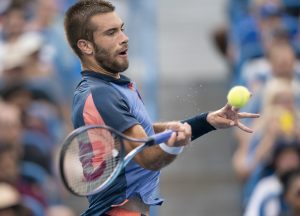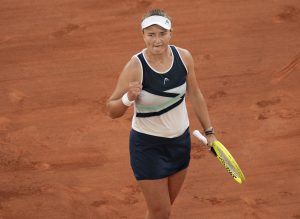It was a match that, on paper at least, promised much. History was at stake for both men, with neither having an inch to give in the race to finish as the ‘greatest of all time‘. Instead, Rafael Nadal struck a shattering blow, crushing his great rival Novak Djokovic to win his 13th French Open title and confirm once and for all why he is the greatest clay-courter of all. There was also the small matter of drawing level with Roger Federer’s record tally of 20 Major titles.
Djokovic made a promising start to the match, landing two inch-perfect drop shots to move to a 40-15 lead in the first game of the match. That was to be the high watermark of his challenge. An errant drop shot handed Nadal a route back into the game and the great Spaniard was not slow to take advantage. He broke and then broke again to take a 3-0 lead. Djokovic forced three break points of his own in Nadal’s next service game, but was unable to convert.
When Nadal rallied from 40-0 to break Djokovic again, the Serbian’s first-set humiliation was all-but complete. Nadal closed out the opener with ease with an ace down the T, leaving his opponent to trudge back to his chair, already looking a beaten man. Djokovic, one of the greatest players of all time in his own right, has long been a master of recovery and rallied from what looked like a similarly hopeless position a year ago in Rome to force a third set against Nadal after being bagelled in the first.
But although he managed to dig out a hard-fought service hold in the first game of the second set, saving three break points to do so, it did little to slow Nadal’s progress. Nadal broke in Djokovic’s next two service games, storming out to a 5-1 lead, meaning that he had won 11 of the first twelve games. Djokovic, increasingly and understandably desperate, was bleeding unforced errors as he sought in vain for a way to knock Nadal out of his stride.
He did not find one. Djokovic managed to hold serve again down 1-5, benefitting from some loose errors from the Nadal racquet, but it did no more than delay the inevitable. Serving for the set, Nadal raced out to a 40-0 lead and, although Djokovic crashed two winners to prolong the set, Nadal made no mistake at the third time of asking to seal the second and take what looked like being an unassailable lead. All that was left for Djokovic was to try to salvage some pride.
He was, at least, in good company in finding himself on the receiving end of a hiding in the final in Paris. In 2008, Federer was brushed aside 6-1 6-3 6-0, whilst Stan Wawrinka bettered his countryman’s effort by only two games in the 2017 final, losing 2-6 3-6 1-6. Nadal proved in those two matches and again at Djokovic’s expense this year, that when he is on his game, he can hardly be troubled let alone beaten on Philippe Chatrier.
In Djokovic’s defence, the conditions conspired against him. Despite some, evidently erroneous, suggestions before the tournament that Nadal might struggle with the slow and heavy conditions, that did not prove to be the case. On the contrary, they heavily favoured his ability to combine astonishing court-coverage with thunderous power from the back of the court. Djokovic, although he could come close to matching Nadal’s athleticism, did not possess anything like his power.
The result was that Djokovic proved entirely unable to hit through Nadal’s defences, meaning that all the Spaniard had to do was wait for his opponent to miss. For a player of his quality, that was hardly a tall order. This may ultimately go down as one of Nadal’s great performances, which would surely be undeserved. The Spaniard did, at times, play superb tennis, but for the most part he merely showed the composure and consistency required to take advantage of conditions that so heavily favoured him.
Djokovic’s resistance stiffened briefly at the start of the third as he held twice in succession. But he was still unable to truly threaten Nadal’s serve and in the fifth game of the set, Nadal broke to love as Djokovic dumped a backhand into the net. Djokovic, determined to avoid humiliation, did manage to break back in Nadal’s next service game and re-established his lead by backing the break up with a hold of serve. But that did little to alter the fundamental complexion of the match.
Nadal steadied the ship with a hold of serve that brought Djokovic’s momentum to a halt, but the Serbian, having at last found a foothold, was in no mood to surrender it lightly. Having played much of the match apparently resigned to his fate, he began to express himself in more typical fashion and was finding the mark off the ground with increasing regularity. Whilst Nadal remained in the ascendancy, Djokovic was able to save a break point in the ninth game of the third set to stay alive.
But when Nadal forced another break point in Djokovic’s next service game, there was no escape for the world #1. Unforced errors, which had been the Serbian’s Achilles’ heel throughout the contest, were his undoing, as he fired a forehand long to hand Nadal the crucial break point, his 17th of the match, before double faulting to surrender his serve. Unsurprisingly, Nadal made no mistake in serving it out, completing a dominant 6-0 6-2 7-5 win to further cement his position in the history of the game.
Nadal will now surely like his chances of surpassing Federer’s Major tally, particularly as the Swiss has been out of action since the Australian Open with a knee injury. For Djokovic, meanwhile, it was another disappointing day in the final at the French Open, although he deserves credit for managing to prolong the match in the third set. Still, it ends what has been an ultimately disappointing Grand Slam season for the Serbian, who added only the Australian Open title to his trophy cabinet.
Main photo:
Embed from Getty Images






